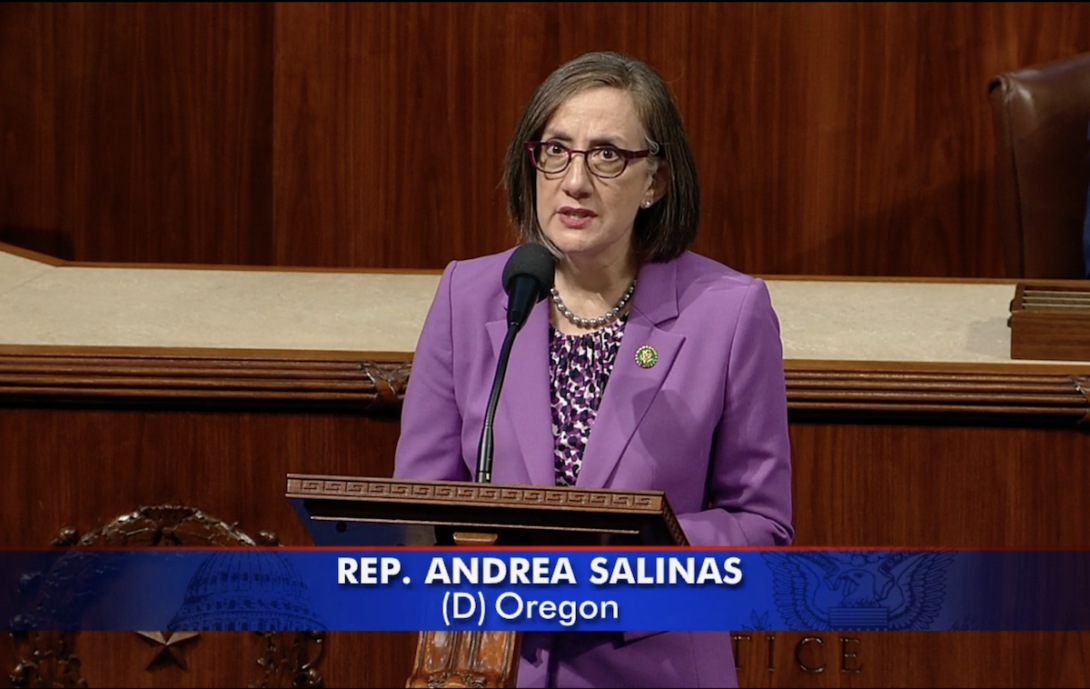
U.S. Rep. Andrea Salinas is asking Congress to pass a bill that would expand telehealth services and provide mental health care to people in rural regions.
Salinas, an Oregon Democrat, introduced a bill on Thursday that would provide $10 million annually in grants for telehealth services in rural areas, with the goal of offering mental health and addiction treatment services to people who work in the farming, fishing and forestry industries. U.S. Rep. Diana Harshbarger, a Tennessee Republican, is also sponsoring the bill.
The bill would help people in rural areas with limited access to in-person mental health services – even as they face stressful environments that can be taxing on their mental health. For example, people who work in farming, fishing and forestry industries are facing more stress and pressure as they adapt to climate change, Salinas said in an interview.
“We’re moving to a different way of doing business in terms of the challenges that climate brings,” said Salinas, who represents Oregon’s 6th Congressional District. “We’re trying to move to more climate-friendly solutions around this. And at the same time, they want to make sure that they stay in business, and that just adds additional stress.”
Patients typically receive telehealth services through online connections, like a video call with a medical provider instead of an in-person visit. In rural areas where people have to travel far to visit a doctor, telehealth can provide quicker and easier access to services.
The bill, called the Home-Based Telemental Health Care Act, would provide up to $10 million a year for grants through 2027. The U.S. Secretary of Health and Human Services and U.S. Department of Agriculture would award the grants.
The grants could go to a variety of groups, such as providers or Medicaid insurers with networks of providers. As a pilot project, the program could expand on a broader scale in the future if it is successful.
In Congress, it’s a challenging political environment to pass bills. But Salinas said she’s hopeful that with bipartisan support, the bill will get traction. U.S. Sens. Mike Rounds, R-South Dakota, and Tina Smith, D-Minnesota, introduced a companion bill in the Senate in March, though it has yet to be heard by a committee.
“They were looking for folks to lead on it on the House side and I raised my hand because I do have a lot of work in agriculture – farming, fishing and forestry,” Salinas said.
Salinas, in her first term, has made mental health access a priority. In February, she started Mental Health Mondays, an initiative that includes weekly messages, social media posts and floor speeches that raise awareness about mental health and the lack of access.
The bill’s co-sponsor, Harshbarger, has worked as a pharmacist.
“By expanding access to telemental health services, this common-sense legislation will help improve patient outcomes,” Harshbarger said in a statement.
Mental health and agricultural organizations are backing the bill, including the National Alliance on Mental Illness, NAMI Oregon, National Rural Health Association, American Psychological Association, American Psychiatric Association, Oregon Council for Behavioral Health, Oregon Cattlemen’s Association and Friends of Family Farmers.
Heather Jefferis, executive director of the Oregon Council for Behavioral Health, said the bill would aid rural and frontier communities and help providers save lives.
“This bill will help expand access for communities and individuals who have significant barriers to care, including geographic distance, stigma, and a lack of providers in their community,” Jefferis said in a statement.